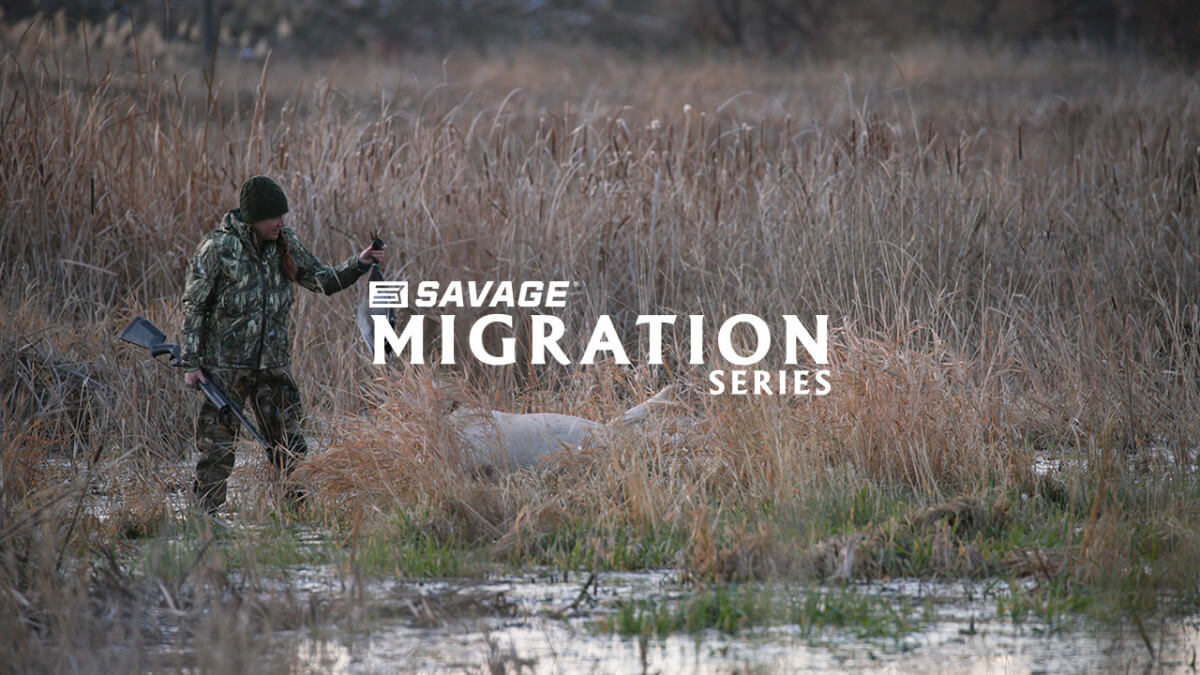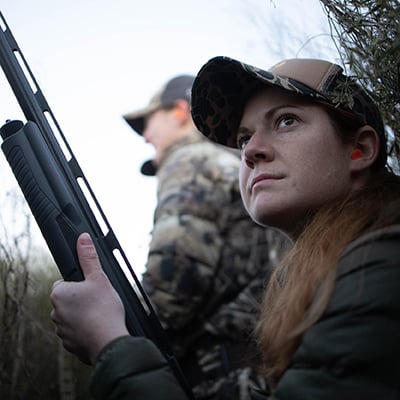- Savage Blog
- Migration Series: Serene River Bottom | Colorado
Migration Series: Serene River Bottom | Colorado

I didn’t grow up hunting. I was 23 years old and living in New York City when I first became interested in hunting. No one else in my family hunts, nor did I have any friends who did. Learning to duck hunt was a lot of trial and error and many solo soggy days in the marsh. I’ve been lucky enough to have met some incredible mentors along the way who have taken me under their wings and taught me most of what I know. Hunting has also helped me fall in love with my hometown all over again. I grew up on Cape Cod as a typical beach baby, fishing, boating, and clamming. As an adult, I only would visit in the summer, but now winter is my favorite time to go! I spend my days rediscovering my favorite fishing spots and oyster beds and turning them into duck holes! I have some of the best sea duck hunting right in my backyard, and I never would have known if I hadn’t become a hunter.
We had a long and somewhat un-fruitful duck season last year. I live in Colorado, a state not known for its waterfowling opportunities. We are not in a direct migration flyway. Water is something we don’t have a whole lot of, and what we do, is mostly private.

Early in the season the high mountain lakes west of Denver can be phenomenal hunting, as well as the shallow prairie ponds out east on the plains. However, one good freeze and that game is done when they ice over. The South Platte River is the main water source that runs through the state and passes through just north of Denver. The ducks typically use the river as a highway to get from where they’re roosting to where they feed and loaf around for the day. That means a lot of pass shooting. I prefer to shoot a gun with a long barrel, but that can be heavy and unbalanced. Having a gun like the Renegauge with the fluted barrel really makes a huge difference for those ultra-fast pass shooting shots where a smooth swing and follow through are critical.
I’m lucky enough to have a good friend Brad Peterson who is a fishing and duck hunting guide on Colorado’s front range. He has a family farm on a stretch of the river that’s an absolute honey hole. Best yet, you can hunt any weekday morning and still make it to your office on time in downtown Denver!

The early season migration can be quite challenging, and it’s all-weather dependent. Denver is a high mountain desert climate, and it can be deceivingly hot in September and October. If we don’t get a good cold snap, the birds won’t show up until quite late in the season. Their migration timing can really change from year to year, which makes planning an early season hunt difficult.
One of my favorite things is to take out new hunters, a passion that Brad and I both share. We have a mutual friend, also named Courtney that we know through fishing. She is a stellar fly fisherman, guide, and is just getting into hunting, so we invited her to join us.
It was a picture-perfect morning, and the ducks just couldn’t help themselves, they wanted to be right where we were! We started off the morning with Brad on the duck calls, and Courtney and I shooting. At one point, Brad had to take a phone meeting and left the blind to walk down the road a bit but could still see us. I put my gun down and took over calling. Not long after, we spotted a single duck circling over the treetops. It made a big loop and then came in low from the left for a landing. I told Courtney to get ready and called the shot. She took aim and the let it rip. The duck hit the water and we cheered! Brad sent us a text message that he saw the whole thing. It was a special moment to share together!

Later in the season, I had the opportunity to hunt with other waterfowlers from across the country. I looked around at the palm fronds woven into the chicken wire creating the blind around us. Peering over the top I saw endless clumps of mangroves and light blueish green water. The sound of the airboat starting broke the silence and our guide jetted away with the sound of 500 box fans all turned on at once. I turned and looked at the sandy yellow lab next to my feet. “Jackson, we’re not in Colorado anymore”.
This was my first time hunting ducks in Texas and something I’ve always dreamed about. I’d heard the stories of redheads swarming like mosquitos on a hot summer day and being able to hunt the late season migration in a t-shirt. It was a big difference to the typical late season day in Colorado when it’s -2 Fahrenheit! Our whole group was from the north: Oregon, South Dakota, and Utah. None of us missed the snow for a few days.
The migration numbers made it easy to limit out on redheads the first morning and set our sights on the high-flying and very wary pintails. They didn’t give us many opportunities, which was just fine because the daily bag limit was only one per person.
We truly experienced all four seasons in our two days of hunting. The second day was downpouring rain and ice cold. I wish I had brought warmer gear after all! When we returned to the lodge for lunch our guide was apprehensive about the afternoon hunt. Safety was on everyone’s mind. The wind had picked up and the palm trees were blowing sideways; whitecaps formed in the bay.
Making the call to forgo the afternoon hunt was smart, and we spent the rainy hours in our lodge swapping hunting stories and photos. Marcus was about to depart on a bison hunt in Mexico, Sallie was excited for the rest of pheasant season, and Casey was picking my brain about the best places to sea duck hunt on the east coast. Each of us went home with a beautiful drake for the taxidermist that we carefully wrapped in paper towels and plastic wrap before packing in soft coolers with ice packs. I can’t wait until it’s ready to pick up so I can relive that hunt all over again!
Follow the Migration Series.


